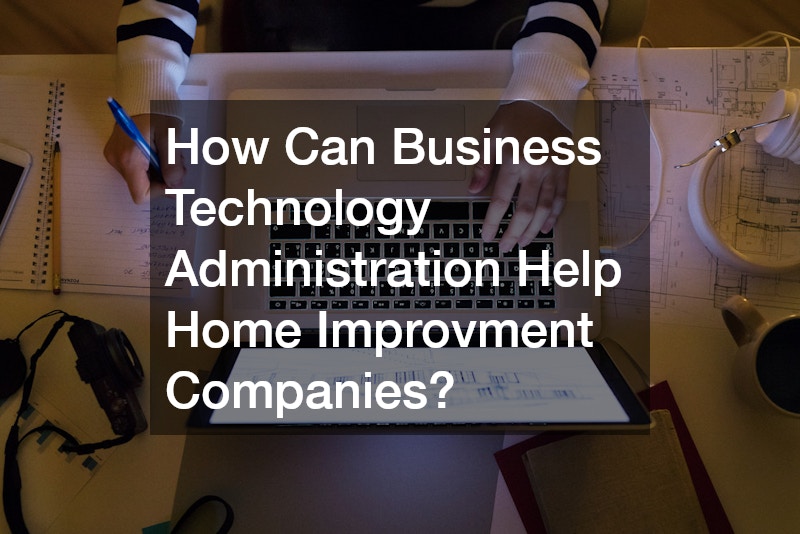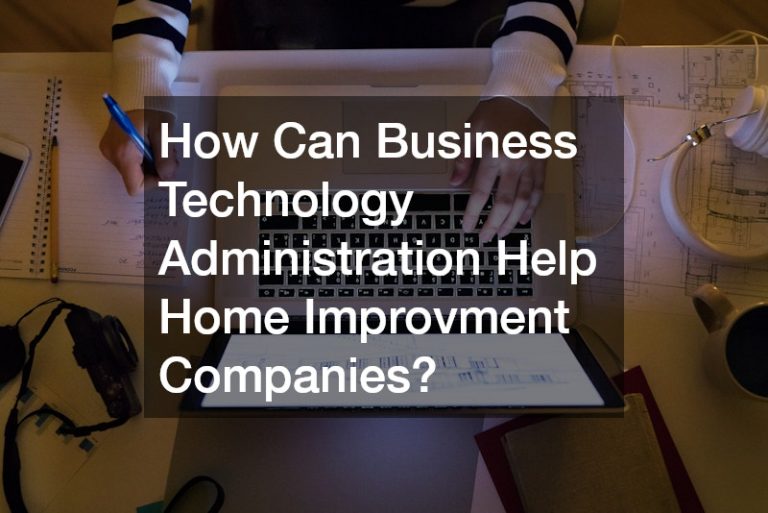In today’s competitive landscape, home improvement companies are continually seeking ways to enhance their operational efficiency and customer satisfaction. Business technology administration (BTA) can be a game-changer in this regard. By leveraging technology effectively, companies in sectors like HVAC, carpet cleaning, and roofing can streamline their operations and deliver superior service. The integration of technology into business practices not only optimizes processes but also allows companies to stay ahead of the competition. In this article, we will explore how BTA can specifically aid various home improvement companies, focusing on different sectors such as well pump repair, dumpster rentals, and more.
Understanding Business Technology Administration
Business technology administration involves managing and integrating technology systems to improve business processes and performance. This includes everything from software solutions that streamline scheduling for HVAC companies to applications that assist demolition companies in project management. By utilizing various technological tools, home improvement companies can enhance efficiency, reduce costs, and ultimately improve customer satisfaction. For example, project management software can help roofers coordinate their teams and materials, while invoicing software can simplify payment processes for driveway contractors. Understanding how to implement and manage these technologies effectively is crucial for success in the home improvement industry.
Streamlining Operations for HVAC Companies
HVAC companies often face challenges related to scheduling, inventory management, and customer communication. Business technology administration can help address these issues through specialized software solutions. For instance, implementing a customer relationship management (CRM) system allows HVAC companies to manage customer interactions more effectively. This technology enables them to track service requests, follow up with customers, and ensure timely service delivery. Additionally, using mobile applications can help technicians access real-time data on inventory and service history while in the field. This not only improves operational efficiency but also enhances customer satisfaction, making it easier for HVAC companies to build long-term relationships.
Enhancing Service Delivery for Carpet Cleaning
In the carpet cleaning industry, customer satisfaction is paramount. Business technology administration can significantly improve service delivery by automating scheduling and dispatching. Many carpet cleaning companies have adopted software that allows customers to book services online, receive confirmation emails, and track the status of their appointments. Moreover, integrating GPS technology enables carpet cleaning teams to navigate efficiently between jobs, minimizing downtime. By utilizing these technological advancements, companies can ensure that they meet customer expectations, thus fostering repeat business and positive referrals. Effective BTA helps carpet cleaning companies to maintain high standards of service quality while managing multiple client requests seamlessly.
Optimizing Project Management for Demolition Companies
Demolition companies often deal with complex projects that require meticulous planning and execution. Business technology administration plays a crucial role in optimizing project management for these companies. Project management software can assist in tracking timelines, budgets, and resource allocation. By using such tools, demolition companies can ensure that projects stay on schedule and within budget. Additionally, cloud-based platforms allow team members to access project information from anywhere, facilitating better collaboration. For example, crews can receive real-time updates about changes in project scope or deadlines, leading to improved efficiency and reduced delays. By integrating BTA into their operations, demolition companies can significantly enhance their project execution capabilities.

Managing Resources for Dumpster Rentals
In the dumpster rental industry, effective resource management is critical. Business technology administration can help streamline operations by implementing software that manages inventory and tracks rental schedules. With the right technology, companies can easily monitor which dumpsters are in use, when they are due for pickup, and what sizes are most frequently rented. This data-driven approach allows dumpster rental companies to make informed decisions about purchasing new inventory and optimizing their fleet. Additionally, using mobile applications can facilitate real-time communication between the office and drivers, ensuring timely deliveries and pickups. By effectively managing resources, dumpster rental companies can improve service levels and customer satisfaction.
Improving Communication for Excavating Services
Communication is key in the excavating industry, where project details can change rapidly. Business technology administration can enhance communication through the implementation of collaboration tools and software. For instance, using cloud-based platforms allows teams to share documents, updates, and schedules seamlessly. This ensures that everyone involved in a project is on the same page, reducing the risk of miscommunication. Additionally, incorporating mobile apps can help excavating teams report progress and issues in real time, allowing for quick adjustments. By leveraging technology to improve communication, excavating companies can operate more efficiently and effectively, leading to better project outcomes.
Streamlining Operations for Well Pump Repair
Well pump repair services often require quick responses to customer requests and efficient scheduling of service calls. Business technology administration can help streamline these operations through the use of specialized software. For instance, a service management system can enable companies to schedule appointments based on technician availability and proximity to the customer’s location. Furthermore, using mobile technology allows technicians to access service histories, customer information, and technical specifications while on-site, ensuring they are well-prepared for each job. This efficiency not only improves service delivery but also enhances customer trust and satisfaction. Ultimately, well pump repair companies that embrace BTA can expect to see a significant boost in operational effectiveness.
Optimizing Customer Management for Roofers
For roofers, maintaining strong customer relationships is vital for business growth. Business technology administration can enhance customer management through the use of CRM systems. These systems allow roofers to track leads, manage customer interactions, and analyze customer data. By understanding customer preferences and needs, roofing companies can tailor their services and marketing efforts more effectively. Additionally, automating follow-ups and reminders can ensure that customers receive timely communications, which is essential for maintaining engagement. By leveraging BTA, roofers can enhance their customer management processes, leading to increased customer loyalty and referrals.

Enhancing Efficiency for Driveway Contractors
Driveway contractors face unique challenges related to project management and customer communication. Business technology administration can enhance efficiency in these areas through specialized software solutions. For example, project management tools can help driveway contractors schedule jobs, allocate resources, and monitor project progress. Furthermore, implementing a customer portal allows clients to track the status of their projects and communicate directly with contractors. This transparency not only improves customer satisfaction but also fosters trust between contractors and clients. By utilizing BTA effectively, driveway contractors can streamline their operations and improve overall service quality.
Utilizing Technology for Gutter Services
Gutters require precise planning and execution to ensure proper installation and maintenance. Business technology administration can play a vital role in optimizing these processes. For instance, using software that tracks inventory can help gutter service providers manage their materials efficiently, ensuring they have the right supplies for each job. Additionally, mobile applications can enable teams to access installation guides and specifications while on-site, reducing the likelihood of errors. By leveraging technology, gutter service providers can enhance their operational efficiency and improve the quality of their work, ultimately leading to higher customer satisfaction.
Automating Operations for Sprinkler Services
Sprinkler services often involve a significant amount of scheduling and coordination, particularly during peak seasons. Business technology administration can help automate these processes, making it easier for companies to manage their workload. For instance, using scheduling software allows sprinkler service providers to optimize their routes and manage appointments more effectively. Additionally, customer management systems can help track service histories and maintenance schedules, ensuring that clients receive timely reminders for seasonal checks. By embracing BTA, sprinkler services can improve operational efficiency and enhance customer satisfaction, paving the way for business growth.
Data-Driven Decision Making in Home Improvement
Data plays a crucial role in modern business strategies. Home improvement companies can benefit significantly from business technology administration by leveraging data analytics to make informed decisions. By collecting and analyzing data on customer preferences, service efficiency, and market trends, companies can identify areas for improvement. For instance, a roofing company might analyze data on past projects to determine which materials yield the best results, leading to better recommendations for clients. Furthermore, businesses can use data to forecast demand, helping them manage resources more effectively. By embracing a data-driven approach, home improvement companies can make strategic decisions that enhance their competitiveness in the market.
Building a Competitive Edge with BTA
In the home improvement industry, building a competitive edge is essential for long-term success. Business technology administration provides companies with the tools they need to stand out in a crowded market. By streamlining operations, enhancing customer communication, and utilizing data analytics, companies can deliver superior service and foster customer loyalty. Additionally, implementing innovative technologies can position home improvement businesses as industry leaders. For example, companies that adopt sustainable practices through technology can appeal to environmentally conscious consumers. By focusing on BTA, home improvement companies can create a robust foundation for growth and success in an evolving marketplace.

Training and Support for Technology Adoption
Successful implementation of business technology administration requires proper training and support for employees. Home improvement companies must invest in training programs to ensure that their teams are comfortable with new technologies. This includes providing resources such as tutorials, workshops, and ongoing support to address any challenges that may arise. Furthermore, fostering a culture of adaptability within the organization can encourage employees to embrace technology and leverage it to enhance their work processes. By prioritizing training and support, home improvement companies can maximize the benefits of BTA, ultimately leading to improved efficiency and customer satisfaction.
Overcoming Challenges in Technology Implementation
While the benefits of business technology administration are clear, home improvement companies may face challenges in implementing new systems. Resistance to change, budget constraints, and lack of technical expertise can hinder the adoption of technology. To overcome these challenges, companies should conduct thorough assessments of their needs and resources before selecting technology solutions. Additionally, engaging employees in the decision-making process can help alleviate concerns and foster a sense of ownership. By addressing potential obstacles proactively, home improvement companies can navigate the technology adoption process more smoothly, ultimately reaping the rewards of improved operations and customer satisfaction.
Future Trends in Business Technology Administration
As technology continues to evolve, home improvement companies must stay informed about emerging trends that can impact their operations. The rise of artificial intelligence, machine learning, and the Internet of Things (IoT) presents exciting opportunities for businesses in this sector. For instance, HVAC companies can use IoT devices to monitor system performance and predict maintenance needs, leading to more proactive service delivery. Additionally, automation tools can streamline administrative tasks, freeing up employees to focus on higher-value work. By staying ahead of these trends and integrating new technologies into their operations, home improvement companies can maintain their competitive edge and enhance their service offerings.

Case Studies: Successful BTA Implementation in Home Improvement Companies
To understand the tangible benefits of business technology administration in the home improvement sector, examining specific case studies can be illuminating. Many companies across various fields have successfully adopted BTA, resulting in improved efficiency and customer satisfaction. For example, a mid-sized HVAC company implemented a comprehensive CRM system that integrated scheduling, invoicing, and customer communication. As a result, they reduced appointment scheduling time by 30% and saw a significant increase in repeat business, as customers appreciated the streamlined communication and timely service.
Similarly, a carpet cleaning company adopted a mobile app that allowed customers to book services directly and track their technicians in real time. This technology not only reduced call volume to the office but also empowered customers with greater visibility into their service appointments. Consequently, customer satisfaction scores increased, leading to a notable rise in positive online reviews and referrals.
In the field of well pump repair, a company utilized a service management system to optimize technician routing. By analyzing historical data on service calls and geographical patterns, they were able to reduce travel time and fuel costs by over 20%. This optimization allowed them to take on more jobs in a day without sacrificing service quality, directly boosting their bottom line.
Demolition companies have also reaped the rewards of BTA. One firm introduced project management software that provided real-time updates to all stakeholders involved in a project. This transparency helped minimize miscommunication and project delays, resulting in completed projects that were both on time and within budget. Clients reported higher satisfaction levels, leading to repeat contracts and referrals.
These case studies illustrate the transformative potential of business technology administration. By adopting tailored solutions that address specific challenges, home improvement companies can not only enhance their operations but also create a positive experience for their customers. As the industry continues to evolve, these examples serve as a reminder that investing in technology is not merely a choice; it is a strategic imperative for sustained success.
Conclusion
Business technology administration offers a wealth of opportunities for home improvement companies to enhance their operations and customer service. From HVAC companies to demolition firms, the effective use of technology can streamline processes, improve communication, and provide data-driven insights. By investing in BTA, these companies can not only meet but exceed customer expectations, fostering loyalty and encouraging repeat business. As the industry continues to evolve, embracing technology will be essential for companies looking to thrive in a competitive marketplace. Ultimately, the integration of business technology administration into home improvement operations is not just a trend; it is a necessary step toward sustainable growth and success.







